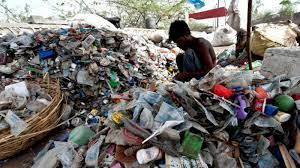CURRENT AFFAIRS
Get the most updated and recent current affair content on Padhaikaro.com
Extended Producers Responsibility on plastic packaging
- IAS NEXT, Lucknow
- 22, Feb 2022

Reference News:-
The government has notified the Guidelines on Extended Producers Responsibility (EPR) on plastic packaging under Plastic Waste Management Rules, 2016. The guidelines will come into effect from 1st July 2022.
Overview of the new guidelines:
Four categories of plastic packaging specified:
- Category one will include rigid plastic packaging.
- Category two will include flexible plastic packaging of single layer or multilayer (more than one layer with different types of plastic), plastic sheets and covers made of plastic sheet, carry bags, plastic sachet or pouches.
- Category three will include multi-layered plastic packaging (at least one layer of plastic and at least one layer of material other than plastic).
- Category four includes plastic sheet or like used for packaging as well as carry bags made of compostable plastics.
The guidelines also include:
- Specifications for reuse, recycling, use of recycled plastic content, and end-of-life disposal of non-recyclable plastic packaging.
- setting up a centralised online portal by Central Pollution Control Board (CPCB) for the registration as well as filing of annual returns by producers, importers and brand-owners, plastic waste processors of plastic packaging waste by March 31.
- Producers of plastic packaging will have to manage 35% of the ‘Q1’ waste in metric tonnes in 2021-22. Q1 is calculated by adding the last two years’ average weights of plastic packaging material sold and pre-consumer plastic packaging waste, and subtracting the annual quantity of plastic packaging supplied to brand owners.
- The EPR target will be increased to 70% in 2022-23 and 100% from 2023-24 onwards.
- The recycling obligation for producers will be 50% for rigid plastics in 2024-25, 60% in 2025-26, 70% in 2026-27, and 80% from 2027-28 onwards.
- Environmental compensation shall be levied based upon polluter pays principle, with respect to non-fulfilment of EPR targets by producers, importers and brand owners, for the purpose of protecting and improving the quality of the environment and preventing, controlling and abating environment pollution.
- For the first time, the guidelines allow for the sale and purchase of surplus extended producer responsibility certificates. Thus setting up a market mechanism for plastic waste management.
Significance:
Along with prohibition of identified single-use plastic items, the new guidelines in India will:
- Reduce pollution caused due to littered plastic waste.
- Promote development of new alternatives to plastics.
- Provide a roadmap for businesses to move towards sustainable plastic packaging.
- Provide a framework to strengthen the circular economy of plastic packaging waste.
- Boost for formalization and further development of the plastic waste management sector.
What are Plastic Waste Management Rules?
MoEFCC notified the Plastic Waste Management Rules on March 18, 2016, and the Solid Waste Management Rules on April 8 the same year.
- As plastic waste is part of solid waste, therefore, both the rules apply to managing plastic waste in the country.
- The Plastic Waste Management Rules mandate minimising the generation of plastic waste, avoiding littering, ensuring segregated storage of the waste at source, and handing it over.
- The rules also mandate the responsibilities of local bodies, gram panchayats, waste generators, retailers, and street vendors to manage plastic waste.
- The rules cast EPR on producers, importers, and brand-owners. Extended Producer Responsibility shall be applicable to both pre-consumer and post-consumer plastic packaging waste.